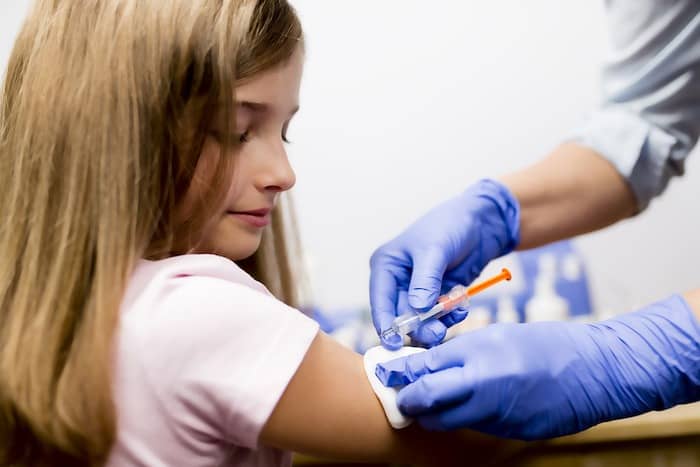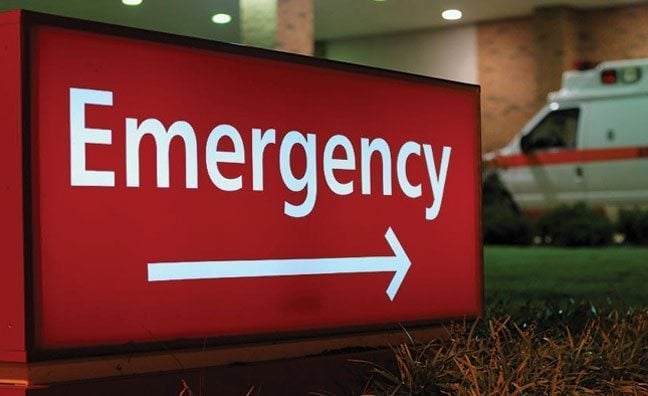Last updated on March 7th, 2024 at 10:10 am
Learn what to do if your child contracts the flu, including how to know for sure if it’s the flu, how to treat it, and warning signs of an emergency.
Flu season is already upon us so let me give you the quick down-low on what this illness is, how to protect yourself, what to do if you or a family member contracts this virus and when to call the doctor.
What Exactly Is the Flu?
The flu, or Influenza, is a viral illness. This means there is no antibiotic, pain pill, or special Tic-Tac that will magically make you feel better. The viral illness needs to run its course for a few days and then it will be gone.
Flu Symptoms
Influenza typically attacks the respiratory tract so you’ll see high fevers, sore throat, cough, sinus pressure, and achy joints. Honestly, most people compare it to being hit by a train. They look and feel horrible. The flu comes on fast and hard. Your child could have 1-2 of these symptoms or all of them depending on the strand of the flu.
- fever or feeling feverish/chills (not everyone with flu will have a fever)
- cough
- sore throat
- runny or stuffy nose
- muscle or body aches
- headaches
- fatigue (tiredness)
- some people may have vomiting and diarrhea, though this is more common in children than adults.
There are 2 types of flu: A and B. The most common type that is seen in a medical setting is Flu A. Influenza B is less common and sometimes involves the GI tract, which can include symptoms such as diarrhea, upset stomach, and nausea, typically with a fever.
The flu is tested by putting a special Q-tip swab up both nasal passages pretty far. Our joke is that we like to “tickle the brain”. The test results are in usually within an hour at a medical facility.
The flu is spread through what’s called “droplet”, meaning if I have the flu and cough on an object, then you touch that object and proceed to eat your lunch or pick your nose, bingo! You won the flu.
Anyone can get flu (even healthy people), and serious problems related to flu can happen at any age, but some people are at high risk of developing serious flu-related complications if they get sick. This includes people 65 years and older, people of any age with certain chronic medical conditions (such as asthma, diabetes, or heart disease), pregnant women, and children younger than 5 years.
Center for Disease Control (CDC)

There is a flu vaccine available for all ages that can help you avoid contracting the flu or shorten the length and severity if you do catch the flu. Speak with your doctor about the pros and cons of the flu vaccine and make the best choice for you and your family.
When Should I Call the Doctor?
If you’re like me, I self-diagnose my household 99% of the time. If you think your child may have the flu, start isolating them and call your doctor.
Review your symptoms with the pediatric nurse/doctor over the phone and if they are confident you have the flu, they may recommend just staying put and could possibly call you in a medication. It may be that easy. If they want to see you in the office, it’s a simple Q-tip test to officially diagnose. Your doctor is there for you!

My Child Got the Flu. Now What?
So you got the dreaded news that your 3-year-old twin has the flu. Now before you have a freakout moment, there is some help. Most medical professionals will offer an anti-viral medication for the treatment of the flu if it’s within 48 hours of the fevers starting.
This anti-viral flu medication can be given to people of all ages and it does have some side effects. This medication doesn’t help much with the symptoms of the flu, it has just been shown to decrease the duration of the flu. The anti-viral will help make that week-long flu visit into maybe a 4-5 day flu visit.
I always suggest to parents to investigate any medication that is prescribed to their child. Look up the ingredients, educate yourself, talk to your doctor, and make the best decision for you and your family.
It’s very important to isolate the family member who is infected until the fevers are down. Be ready to invest in some Clorox wipes because everything needs to be sanitized after that bug hits your home.
You’re going to want to bleach any surfaces clean that they touch and make sure if they…
- Cough: wash hands
- Blow nose: wash hands
- Thinking about coughing: wash hands again
It really isn’t a bad idea to buy some medical masks if your child is older and has the flu. Have them wear the mask if they are going to be around the house and around other people.
The only job that you’re going to have is keeping that child well hydrated and fevers down. Have plenty of Tylenol and Motrin around and expect the worst, meaning 102-103 F degree fevers for a few days with lots of congestion and body aches.
It feels like the end is never in sight but the day will come and they will most likely bounce back quickly. Your child will be home from school/daycare until the fevers are gone without any fever-reducing medication. The rule of thumb is keep them home until they have gone for 24 hours with no fever or vomiting.

What Are Emergency Warning Signs of the Flu?
Now we know to expect high fevers but, if it’s been a few days and it seems like they just aren’t getting better, its best to see a doctor. There are a few occasions where flu can intertwine itself with other sicknesses. If a wet cough is lingering I would ask for an outpatient chest x-ray just to rule out any other ailments.
If you see any of these symptoms in your child suffering from the flu, head to the hospital emergency department right away. Source: CDC
- Fast breathing or trouble breathing
- Bluish lips or face
- Ribs pulling in with each breath
- Chest pain
- Severe muscle pain (child refuses to walk)
- Dehydration (no urine for 8 hours, dry mouth, no tears when crying)
- Not alert or interacting when awake
- Seizures
- Fever above 104°F
- In children less than 12 weeks, any fever
- Fever or cough that improve but then return or worsen
- Worsening of chronic medical conditions
I truly hope you can avoid the dreaded flu just for the sake of your sanity but in all honesty don’t let those three letters scare you too much. You got this rock-star mama and you’ll be just fine. May the flu stay away from you! ? Till next time, keep it healthy, keep it real.
xoxo, Nurse Gwenn
Click here more information about Influenza

Gwenn Black is married to her hubby of 13 years and is a full-time mama to her 5 children (including identical girls) and is an ER nurse. She enjoys anything outside, spending time with her family, and a hot cup of coffee.







